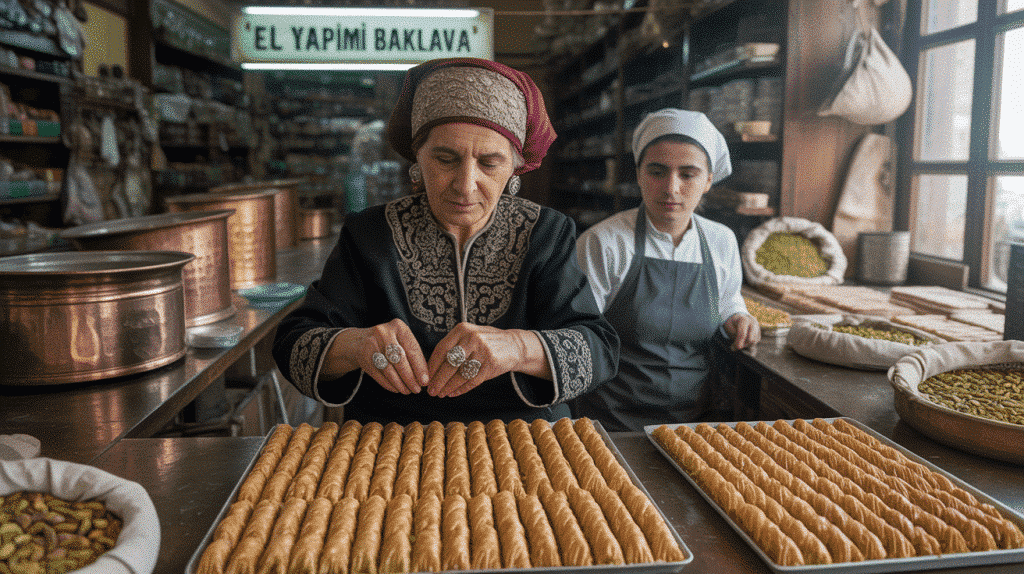Exploring Local Traditions and Customs in Gaziantep: A Guide for International Students
The Rich Culinary Heritage of Gaziantep
Gaziantep stands out as a gastronomic powerhouse in Turkiye, boasting a cuisine recognized by UNESCO. In 2015, the city was included in the UNESCO Creative Cities Network List and received the “Local Gastronomy and Tourism” Award of the European Destinations of Outstanding Project (EDEN). This recognition underscores the city’s exceptional culinary traditions that have been preserved through generations.
A Culinary Paradise
The culinary landscape of Gaziantep is remarkably diverse, featuring an array of dishes that include:
- More than 30 types of kebabs
- 40 varieties of aubergine dishes
- 50 kinds of vegetable dishes
- 30 types of yogurt-based dishes
- 30 different soups
- 30 varieties of stuffed vegetables and grape leaves
- 20 types of pastry and lahmacun
- 30 kinds of desserts
In total, Gaziantep boasts approximately 500 original dishes, with 35 of them officially registered. Noteworthy establishments, such as İmam Çağdaş, which has been serving traditional dishes since 1887, provide authentic experiences of local specialties like Ali Nazik (grilled meat and eggplant served with yogurt) and Beyran soup.
Opportunities to Explore Culinary Traditions
For students enrolled in universities such as Demiroglu Bilim University or Ostim University, participating in local food tours and cooking classes can be great ways to not only learn about but also actively experience Gaziantep’s culinary wonders. Engaging with local chefs and exploring the markets can provide invaluable insights into the significance of each dish and its cultural context.
Traditional Hammam Culture: A Social Institution
The Turkish bath, or hammam, tradition is deeply embedded in Gaziantep’s cultural fabric. Hammams serve as more than just cleaning facilities; they are important social institutions where various customs and rituals unfold.
Gendered Spaces and Customs
In Gaziantep, hammams typically operate with gender designations—women during the day and men at night. The city is home to a double-section hammam that serves both genders in separate areas. Women’s hammam rituals are especially elaborate and may include:
- Special preparations using silk hammam rugs
- Ornate bathing kits (fardels) adorned with handwork
- Silk-woven loincloths (mezers)
- Needle-laced, sequin-beaded head covers
- Silver or specially embellished hammam bowls (tas)
- Gold wire-embroidered bath towels (meşefe)
Experience the Hammam Culture
For international students attending institutions like Aydin University or Istinye University, taking a trip to a local hammam can be transformative. It is not only an opportunity to relax but also a way to understand the social dynamics and cultural practices that permeate Gaziantep’s daily life.
Seasonal and Religious Celebrations: Embracing Local Customs
Ramadan holds special significance in Gaziantep’s cultural calendar. During this holy month, unique traditions emerge, adding a vibrant layer to the local customs. One such tradition is the consumption of Licorice Sherbet (Meyan Şerbeti), a natural beverage made from licorice fibers, water, cinnamon powder, clove, and rose water. This refreshing drink is particularly popular during Ramadan and other significant religious days.
The Tradition of Sherbet Vendors
Licorice sherbet is often sold by traditional vendors dressed in culturally distinctive attire. These vendors traverse the streets, attracting customers with rhythmic sounds created by rattling bowls against each other. This unique aspect of Gaziantep’s tradition not only quenches thirst but also fosters a sense of community.
Engaging in Celebrations
International students studying at universities like Uskudar University or Beykent University may enjoy participating in these seasonal festivities. Engaging with local families during Ramadan can offer a firsthand experience of workplace and social practices that are integral to living in Gaziantep.
Conclusion: The Importance of Cultural Immersion
For international students pursuing their education in Gaziantep, understanding and participating in local traditions illuminates the vibrant history that defines this remarkable city. Each culinary experience, hammam visit, and seasonal celebration fosters a deeper connection to not only Gaziantep but also to Turkiye as a whole.
By choosing to study in Gaziantep, students are not just enriching their academic journeys but are also embracing a comprehensive cultural experience that will resonate throughout their lives.
Take the Next Step with Study in Turkiye
Are you ready to explore educational opportunities and immerse yourself in the culture of Gaziantep? Contact us today to learn more about studying in Turkiye and how we can assist you in finding your dream university.

